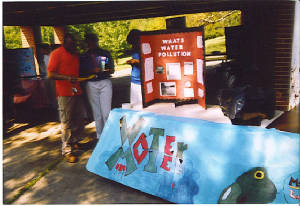|
|
 |
|
There are examples of my work on this page
|
 |
|
Instructional Planning Skills
How Ecosystems Work Unit
October 2005
Environmental Science (11-12th grade)
Students perform better when they know what is expected of them. This unit plan is an example of what my students receive
at the beginning of each unit. It has the Georgia Performance Standards, daily activities, homework and extra assignments.
My students know what to expect each day and can plan accordingly. This enables students to complete assignments even when
they are absent. It also allows parents to have access to what their students are doing each day
Environmental Science: How Ecosystems Work Unit
Objectives:
1.Distinguish the ecological roles of producers, consumers and decomposers.
2.Design a food chain and a food web.
3.Define energy pyramid and explain how trophic levels impact the pyramid.
4.Describe water, carbon, and nitrogen cycles.
5.Explain how humans impact the biogeochemical cycles
6.Describe primary and secondary succession.
9/23 Journal/GHSGT Question
Ecolog pg. 54
Case Study pg 58-59
O.V.S.S. 3.1
9/24 Journal/GHSGT Question
Toxicity Testing
Points of View pg. 76-77
9/25 Quiz
Journal/GHSGT Question
Location Food Webs
O.V.S.S. 3.1
9/26 Journal/GHSGT Question
Transparencies 6-8
Energy Flow in Ecosystems Activities
9/29 Quiz
Journal/GHSGT Question
Owl Pellet Pre Lab
O.V.S.S. 3.3
9/30 Journal/GHSGT Question
Owl Pellet Lab
10/1 Journal/GHSGT Question
Case Study pg. 68-69
Environmental Careers pg. 374-375
10/2 Quiz
Journal/GHSGT Question
Pretest
All Unit Assessments 10/03/05!
All Assignments due 10/03/05!
In addition to the above assignments, you must complete one of the following:
1.Field Activity pg. 60
2.Field Activity pg. 70
3.Complete Chapter 3 Review handouts.
|
 |
|
Professional Commitment and Responsibility
NSTA Conference Presentation
April
Motivating Students
I believe that further development in my career is essential; therefore I attempt to attend at least two professional
conferences a year. In 2001, I completed my first Service Learning project and was so excited about it that I wanted to share
the experience with other teachers. I signed up to present my project at that years conference and it was a success. The
attendees asked many questions and I was able to assist them via email as they attempted their service learning projects.
The experienced left me refreshed and energized. I now have the presentation bug and have presented in over six conferences
held around the world. This artifact is the Power Point document of that first presentation called Motivating Students.
|
 |
|

Partnerships
Wonderland Gardens Community Partners
April
Environmental Science
Community Partnerships are essential in any course. It provides real-life examples of the subject matter and gives purpose
to what is learned. I am fortunate to have had a community partner with Wonderland Gardens. Wonderland Gardens is a local
community garden that holds classes for schools and community members. My students have studied horticulture, agriculture,
landscape design and mentored younger students at the garden. The Earth Day Symposium that began four years ago on the school
site is now held at the garden and is open to the entire community thanks to our partnership. As a result of our combining
our resources, more than five community organizations now participate in the Earth Day Symposium including Fernbank Science
Center, the National Wildlife Federation, Keep Dekalb Beautiful, local congressmen, and the University of Georgia. This artifact
contains photographs of my many field trips to the garden with my students.
|
 |
|
Assessment of Student Learning
Daily Quizzes
January
Physical Science
My students have homework assignments each weeknight. I assess if the students have grasped the major concepts of their
work through daily quizzes. The quizzes are brief, four or five questions, that the class reviews upon completion. I can
quickly view the quizzes as I collect them from each individual student and determine what concepts I need to place more focus
on during the lesson each day. This also gives the students an idea of what they need to know to succeed on the unit assessments.
Quiz 2.4
What are the states of matter?
Give an example of a physical change.
Give an example of a chemical change.
What is the density of a liquid with a mass of 163 g and a volume of 50.0 mL?
5 m = ? cm
|
|
|
|
|
 |

